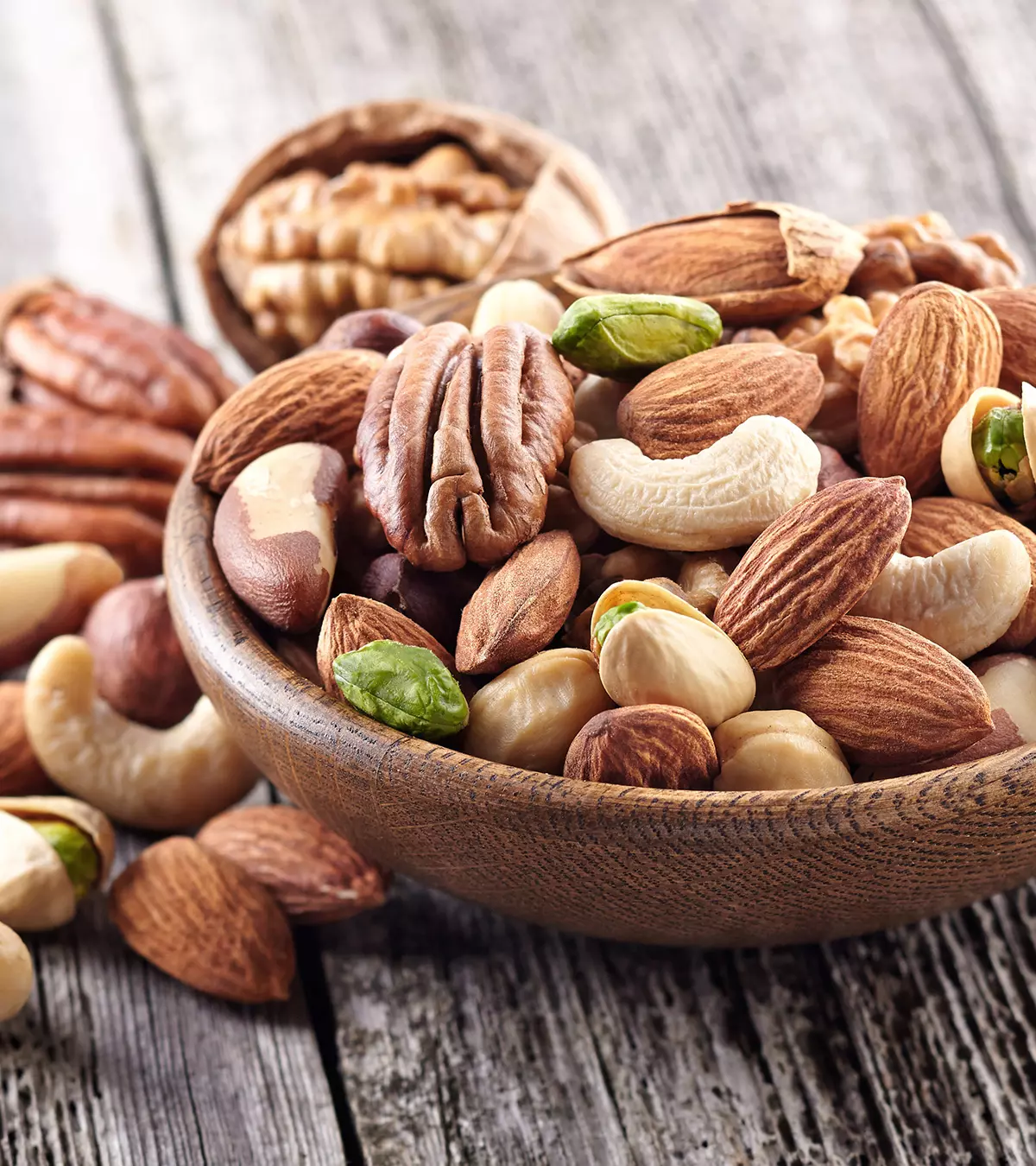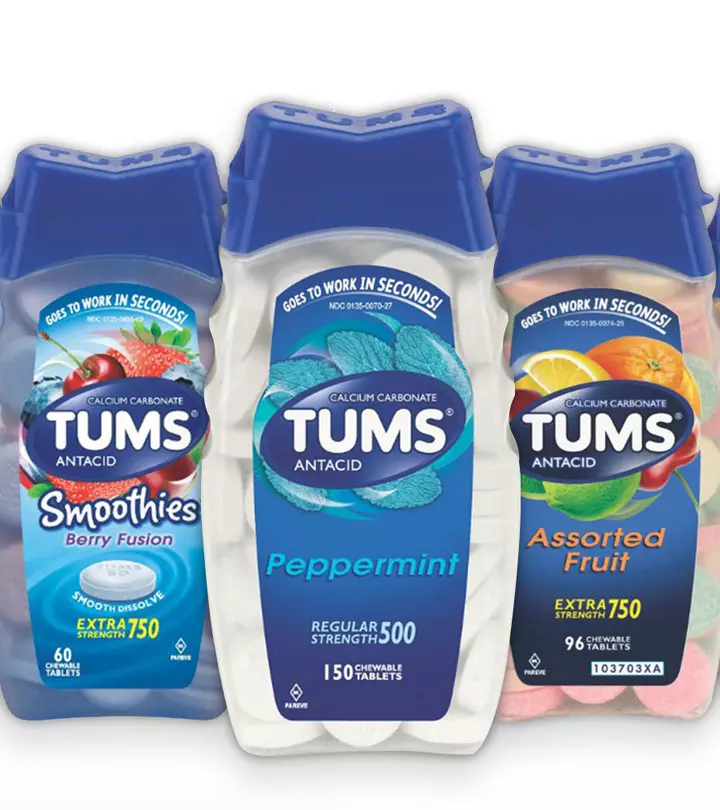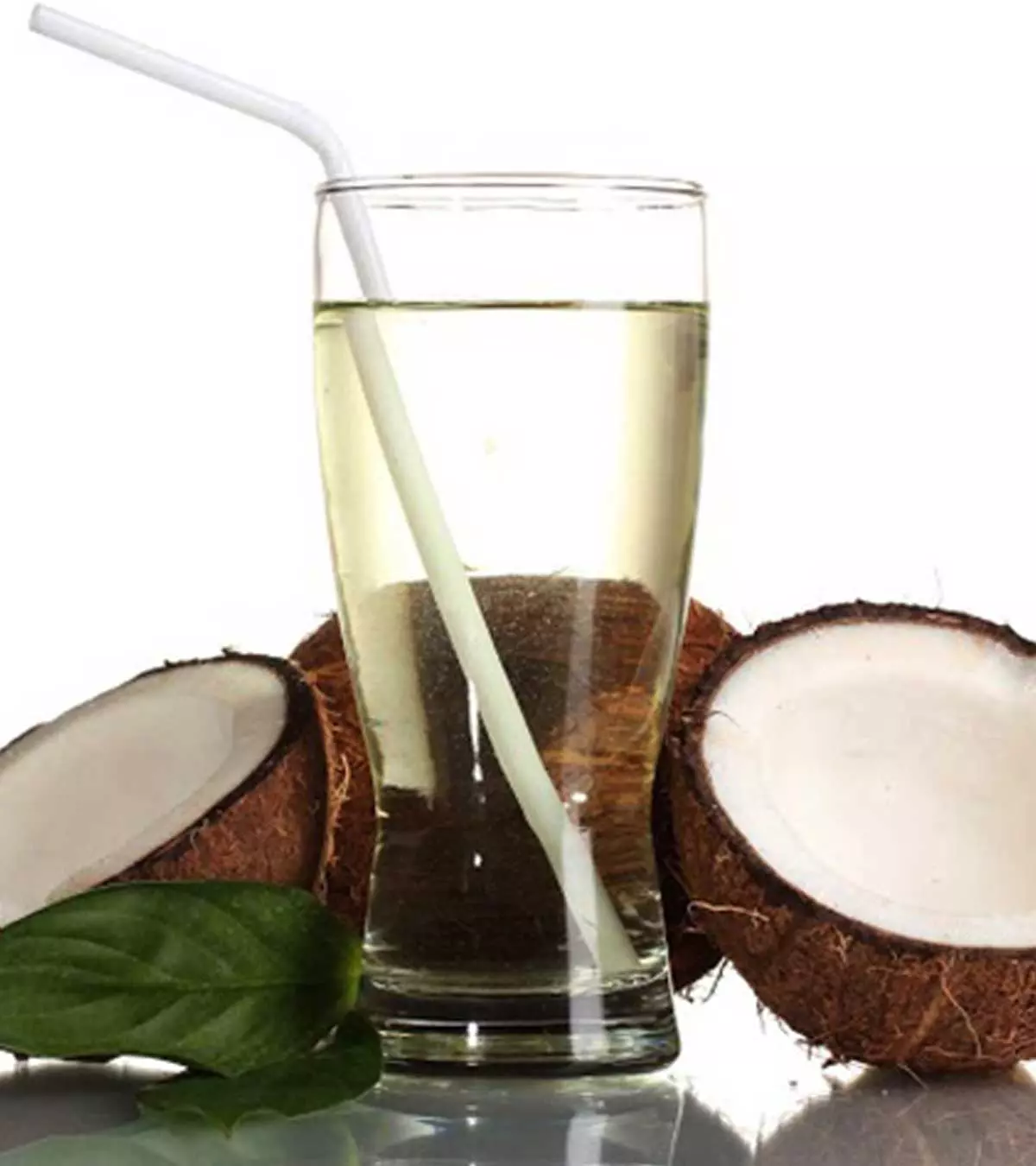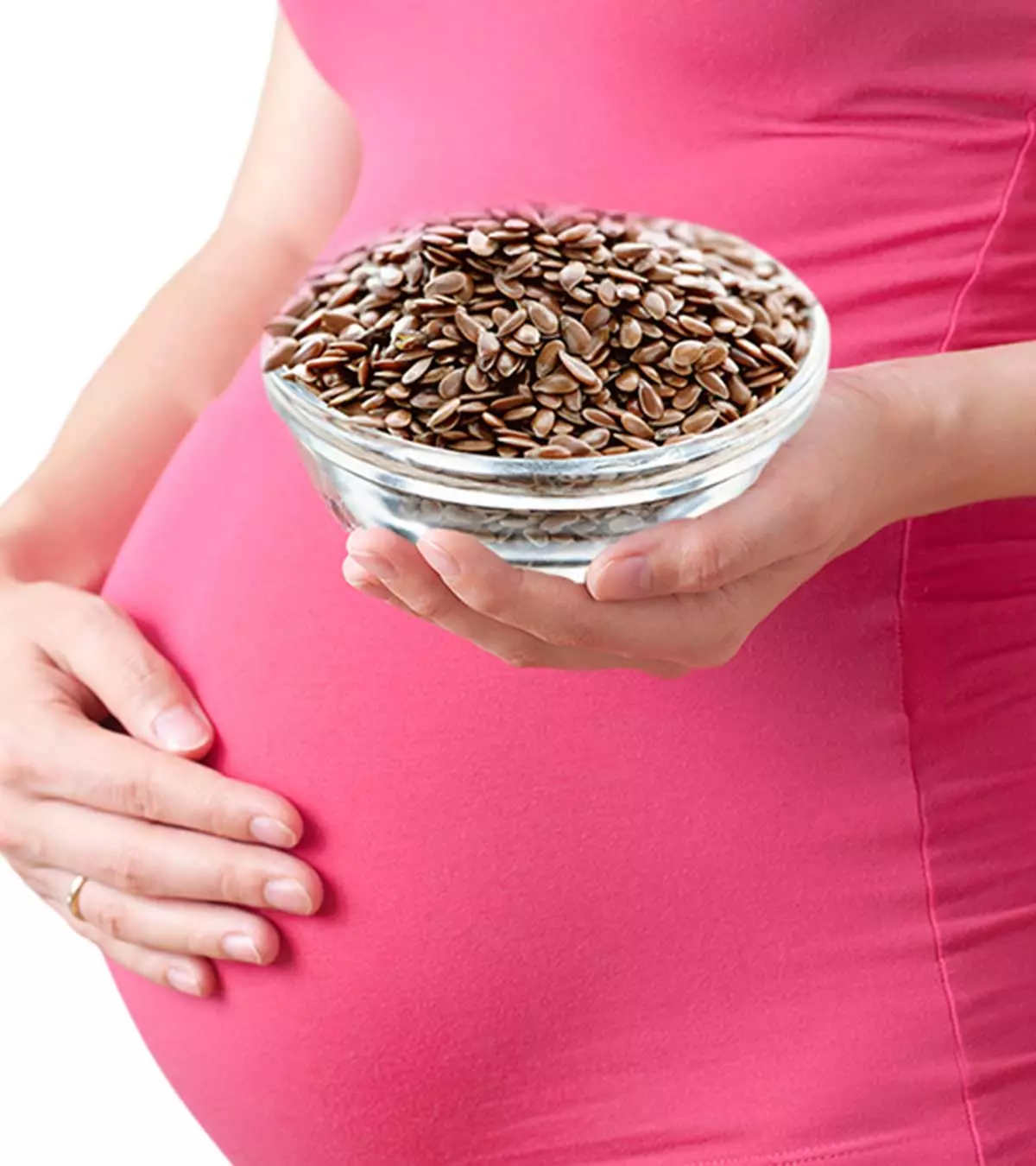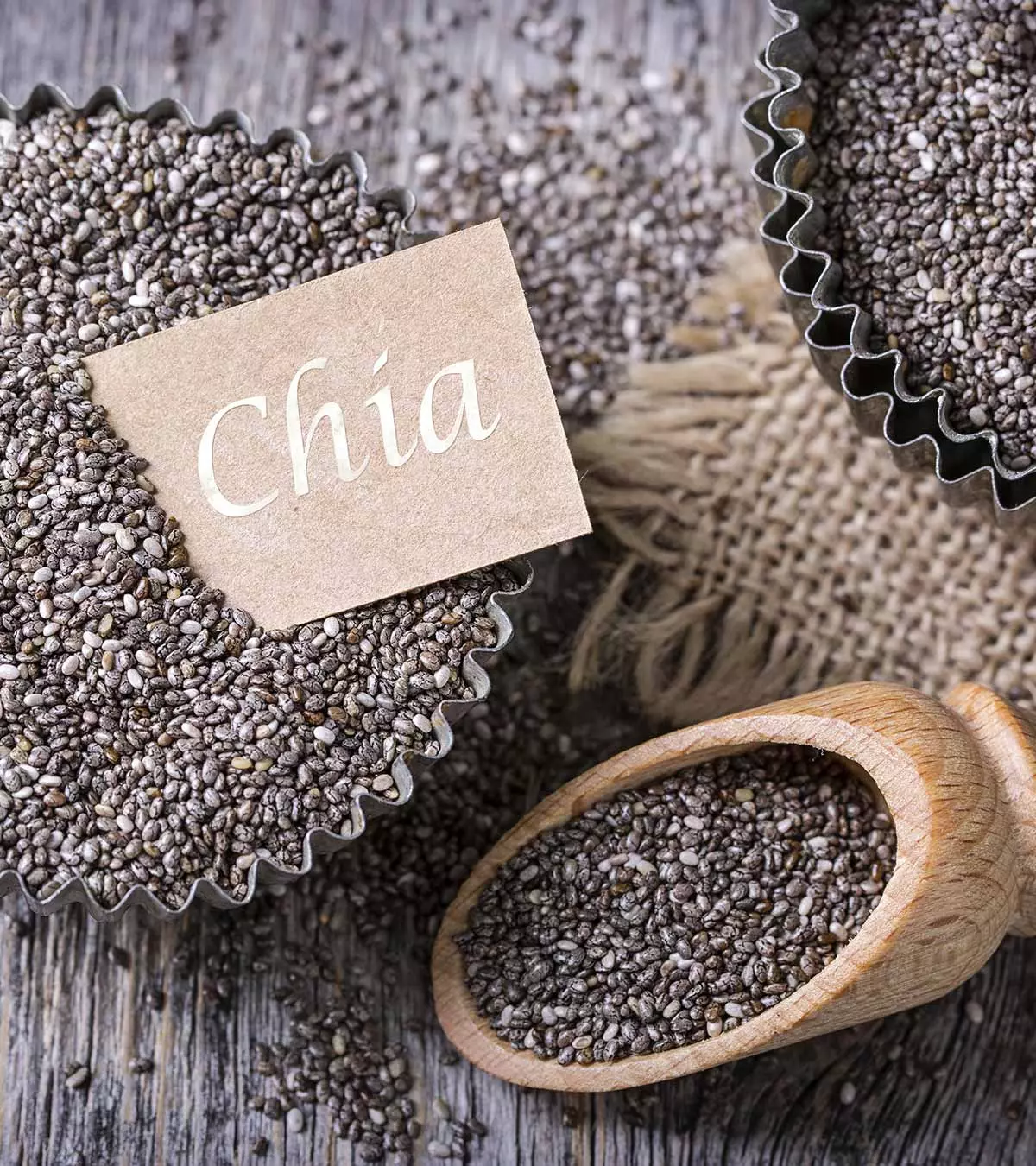
Image: iStock
Coconut oil is an edible oil produced by pressing fresh or dried coconut meat.

Besides adding it to food, you can use it for hair strengthening and skin care as a moisturizer. Since it has several benefits, it should be considered whether the use of coconut oil during pregnancy is safe and beneficial.
Read on to learn more about whether it is safe to use and consume coconut oil during pregnancy, its benefits for you and the baby, how to use it, its medical uses during pregnancy, and its effect on breastmilk.
Key Pointers
- Coconut oil can benefit pregnant women by regulating body cholesterol and relieving pregnancy symptoms like heartburn and morning sickness.
- The moisturizing properties of coconut oil can nourish the skin and hair, preventing dryness, stretch marks, sore nipples, and dark circles.
- Coconut oil can help strengthen the immune system and improve nutrient absorption, protecting the mother and the fetus against common ailments like colds and flu.
- Coconut milk and water are associated with fertility and can ease labor, making them helpful for pregnant women.
Coconut Oil – The Pregnancy Superfood
Typically, pregnancy superfoodiA food that contains essential nutrients that are beneficial to maintain good health is something that provides the nutrients that directly contribute to the growth, development, and well-being of your unborn baby. These foods include, among others, eggs, milk, beans, legumes, broccoli, beef, berries, pasteurized cheese, salmon, yogurt, and coconut oil.
Coconut is fast emerging as a popular food choice for pregnant women. Organic Virgin Coconut oil and coconut milk are highly beneficial for pregnant and nursing women. Here’s why:
- The use of coconut oil in the third trimester reduces the perinatal mortalityiStillbirth and early neonatal death by more than 50% (1).
- Coconut oil has potent antiviral and antifungal properties. Hence, it is effective in preventing colds, flu, and other viral infections. During pregnancy, this might be an important protection for you, as pregnancy wreaks havoc on your immune system, making you susceptible to various diseases.
- With coconut oil, you can minimize your intake of over-the-counter medications, which have an adverse effect on you and your growing baby.
- It contributes to the development and strengthening of your baby’s immune system. Another interesting thing to note is that coconut oil is an essential ingredient of the baby formula. This is perhaps because it is a source of lauric acid, which acts as an immunity booster, anti-inflammatory and hence reduces the risk of infections (2)
- Coconut oil and milk may be gaining importance now, but they have a long history of association with pregnancy and fertility. In India, coconut is considered as a natural remedy for infertility, and in Thailand, it is the first solid food for babies.
- Consuming coconut water in pregnancy offers many benefits (3). The high electrolyte content in the water contributes to better blood circulation in the body, thereby preventing common leg and foot pains that most expectant mothers experience with advancing gestation. It also helps in speeding up the labor and preventing morning sickness.
How Safe Is Coconut Oil During Pregnancy?
Coconut oil comes with several benefits. It is a great natural alternative to the many expensive skin creams and hair conditioners. It doubles up as an immunity booster and is a perfect replacement for traditional cooking oils. However, as a pregnant woman, it is quite understandable to wonder about the health concerns associated with consumption of coconut oil. Also, you may want to know how much is good.
Talking about the quantity, moderate consumption of coconut oil during pregnancy is quite beneficial. Coconut oil is almost 100% saturated fat and as per the American Heart Association and other health organizations, it is advisable to limit your intake of saturated fats. It is important to understand that not all saturated fats can have an adverse impact on your body. The American Heart Association recommends saturated fats should make up no more than 5 to 6% of your daily calorie count.

Coconut oil contains lauric acid, which is a medium-chain fatty acid (MCFA). This fat has a positive impact in regulating your cholesteroliA waxy substance produced by the liver and found in the blood levels. It also has antimicrobial features and hence, it is rather safe to say that lauric acid is a ‘safe’ saturated fat. Consuming coconut oil, but in moderation, will ensure that your pregnant body absorbs fat-soluble vitamins and this, in turn, will help your body and your unborn baby derive the maximum nutrition.
Healthy Effects Of Coconut Oil During Pregnancy
- You may include a moderate amount of virgin coconut oil in your diet after consulting a health expert. Research shows that the medium-chain fatty acids (MCFAs) and monoglyceridesiEmulsifiers that help oil and water mix in coconut oil can help modulate the immune system (4). However, no conclusive studies show maternal ingestion of coconut oil affects fetuses’ immunity in any way.
- Also, coconut oil will help you with other pregnancy-related symptoms, such as morning sickness, heartburn, and constipation. Did we just hear you heave a sigh of relief?

- An animal study in the International Journal of Developmental Neuroscience in 2011 found that when stressed-out pregnant rats were given supplements of coconut oil in their diet, their babies recovered better from low birth weight and compromised locomotor skillsiThe activities that allow one to walk, crawl, bend, twist, jump, etc. much faster than the pregnant rats not given these supplements (5).
- Coconut oil is also effective when used topically. It is a natural moisturizer that prevents the harmful effects of chemical-based moisturizers. It prevents stretch marks on the stomach.
Mahima Satvik, a mother and writer, shares how she incorporated coconut oil into her DIY belly butter recipe to soothe an itchy belly while pregnant. She says, “I remember one evening, while I was enjoying my favorite TV show, I felt my belly skin stretching and itching. Instead of buying expensive creams, I whipped up my own using coconut oil, cocoa butter, and a dash of vitamin E oil. Not only was it cost-effective, but knowing exactly what I was applying to my skin gave me peace of mind (i).”
- Coconut oil has antibacterial, antifungal, and antioxidant properties, which can help prevent cold, flu, and other viruses.
 Quick fact
Quick factWhether you want to use coconut oil for topical applicationiUsing on the skin or consumption, pregnant women should always opt for extra virginiOil that is extracted without using chemicals or heat coconut oil. This is natural and not chemically treated and hence, absolutely safe during pregnancy.
Benefits Of Coconut Oil During Pregnancy
Coconut oil is bursting with health benefits for pregnant women. Here is a list of all the benefits that the oil offers expectant mothers.
1. Anti-infection properties of coconut oil
Coconut oil is good at preventing most fungal, viral, and bacterial infections. Just about two tablespoons a day can give you an immunity boost during pregnancy, thereby protecting you and your unborn baby from flu, colds, and other common ailments (6).
2. Great source of lauric acid
After breast milk, coconut oil is the next best source of lauric acid. Lauric acid helps with milk production during and after pregnancy so that your baby ends up getting high-quality breast milk that will keep him healthy (7).
3. Can substitute dairy
All dairy products are filled with goodness. However, not everyone can have them all during pregnancy. Pregnancy can cause some very strange food cravings as well as aversions. Food aversion to dairy products is quite common, and for those who are missing out on milk and other dairy products, coconut oil can be a great alternative with almost the same qualities.
4. Helpful in preventing pregnancy side effects

Pregnancy can bring with it a host of minor troubles such as morning sickness, constipation or heartburn. Coconut oil acts as a natural remedy for all adverse side effects of pregnancy. The oil can have a very soothing effect on your digestive health and contribute to reducing the impact of acid reflux. Pregnancy may also give you some sleepless, tiring nights. You can use coconut oil as an eye cream to lessen the visibility of those unsightly dark circles.
5. Soothing aid for lactating mothers
Among the many problems that lactating mothers face when they choose to breastfeed, one of the most troublesome is cracked and sore nipples. The topical application of coconut oil can be soothing.
6. Helps nourish dry scalp
A common problem during pregnancy (thanks to fluctuating hormones) is a dry scalp. You can combat this problem with coconut oil. Mix a little coconut oil with castor oil or almond oil. Apply this oil mix on your scalp and leave it overnight. The following day you can wash it off with lukewarm water. It will nourish your scalp and keep dryness at bay.
7. Promotes oral health
Oil pulling or rinsing your mouth with coconut oil could be good for your teeth and gums when done along with the regular oral care routine. Studies hint that it might help reduce plaque, but more research is needed to confirm the observations. Some studies say coconut oil pulling lowers the number of bacteria in saliva. It seems as good as using chlorhexidine mouthwash for plaque, gingival index, and bleeding-on-probing, but scientists are still studying it. So far, no bad effects of oil pulling have been found. Therefore, including coconut oil in your oral care routine may contribute to better dental health (8).
8. Treats stretch marks
Pregnancy can leave you with some very nasty stretch marks all over your belly (9). Stretch marks occur because of the stretching of the skin and underlying muscles to accommodate your growing baby. This tends to render the skin loose after childbirth, causing all those unsightly stretch marks. The topical application of coconut oil during pregnancy can prevent the formation of stretch marks as the oil moisturizes the skin and improves its elasticity.
Dr. Michael Green, a board-certified obstetrician-gynecologist from Lake Arrowhead, California, says, “Coconut oil’s moisturizing properties can help prevent stretch marks by hydrating the skin. It is dense in medium-chain fatty acids (MCFAs), which are easily absorbed by the skin and can strengthen the connective tissue. This can help reduce the appearance of stretch marks by making the skin more resilient and less likely to tear.”
Recalling how coconut oil helped her avoid stretch marks and provide relief from an itchy belly during pregnancy, an anonymous blogger and mother remarks, “Throughout my pregnancy, I used coconut oil to help my itchy growing belly. It smelled so good and helped to hydrate my skin while avoiding stretch marks. As you know, there aren’t any added chemicals, preservatives, or toxins in coconut oil which makes me feel really good about putting it on my skin (ii).”
 Quick fact
Quick factThe best part is you can continue using coconut oil even after giving birth. You can use it to treat cradle cap and nappy rash. The oil also makes a brilliant baby massage oil. The nutrients penetrate your baby’s skin to help him develop strong muscles and bones.
How Coconut Oil Helps The Baby In The Womb?
The saturated fat content of coconut oil will help in the accumulation of fats that will provide adequate energy and proper bodily function, necessary for pregnancy. During pregnancy, your baby derives his essential nutrients and calories from your body. After your baby gets her supply, the remaining nutrients are absorbed by your body. Hence, these fat deposits will help in keeping you energized while making sure your baby receives his share.
So go right ahead (obviously after consulting your specialist) and use coconut oil during pregnancy. If you have never used the oil before, continue reading as we have some tips to help you make the oil a part of your daily life.
How To Use Coconut Oil?
There are many ways of incorporating coconut oil into your daily pregnancy diet. We have compiled a few ways that you can try:
1. Add coconut oil to smoothies
This is one of the best ways to have coconut oil while pregnant. You can add about a tablespoon of extra virgin coconut oil to your smoothies. This will give you your share of lauric acid on a consistent basis as well as provide you with a filling and energizing drink.
2. Stir fry your healthy snacks with coconut oil
If you like your veggies fried as a snack, you can sauté them in coconut oil. The oil has a high tolerance to heat and is hence, one of the best for frying and cooking without worrying about toxins in super-heated oil.
3. Use as a choco spread
You can mix coconut oil with chocolate powder and use it as a spread on your healthy brown bread. You also can smear your favorite fruits with some of this delicious choco spread and enjoy the health benefits offered by the coconut oil and fiber-rich fruits.
4. Use coconut cream in place of milk

Coconut cream can be used instead of milk in your tea. Of course, you should stay away from caffeine for optimum prenatal care. Also, as a cream base for your smoothies, coconut milk can be a great, nutritious alternative to regular milk.
5. Coconut cream tropical smoothie
Take half a cup each of frozen mango, pineapple, and papaya. Add one-third cup coconut cream or coconut kefir to this. You can also add to other fertility-boosting superfoods such as maca, spirulina, or flaxseed oil. We suggest you try and use organic ingredients as much as possible.
6. Coconut kefir
This is a probiotic drink made from coconut water. You can use organic coconut water or packaged coconut water. Read the label carefully if you are purchasing packaged coconut water. It shouldn’t contain harmful ingredients.
Keep the coconut water in a jar and add to it the kefir starter. A liter of coconut water will take about one packet of kefir starter. Let the water stay for four to five days. The content will become cloudy after which you can add a dash of lime and an organic sweetener.
Consider using coconut oil as a base for homemade salad dressings and combine it with apple cider vinegar and herbs for a nutritious twist. You can also use coconut oil in baking. You will love the way your hair and skin look and feel during pregnancy. You never have to worry about hair fall, dry skin or free radicals. The oil will take care of everything and leave you free to enjoy your nine months of pregnancy.
Medicinal Uses Of Coconut Oil During Pregnancy
1. Coconut oil for improving fertility
One of the important things to take care of when you are trying to conceive is weight management through maintenance of optimal body fat, as it can have an impact on your fertility. Adipocytes or body fat cells produce estrogen, which is essential for a healthy reproductive system of a woman. Women who lack an adequate amount of body fat will have trouble with ovulation and fertility. In obese women, there is an excess production of estrogen which may also cause fertility issues.
Coconut may have a positive effect on your fertility. The oil contains saturated fat, something which nutrition experts may ask you to avoid. However, your body needs a certain amount of saturated fats to produce cholesterol and maintain a proper hormonal balance. Coconut is a medium-chain fatty acid, and that makes it easy for the body to metabolize the oil (discuss with your nutritionist or doctor ) as usage depends on other underlying conditions as well.
2. Treating yeast infections during pregnancy

Candida albicans is the offending microorganism that causes yeast infection in women. Candida is usually present in our body in small numbers, in warm, moist areas. A yeast infection may happen when there is a proliferation of Candida. This increase in number can occur due to many reasons. A yeast infection is not always severe or life-threatening, but it may cause discomfort if you don’t treat it.
During pregnancy, several hormonal changes may cause a change in the pH level of the vagina. This may contribute to an increase in Candida, leading to yeast infection. The common symptoms of this infection include itching in the genital area, pain in the vagina, and whitish discharge from your vagina (10).
There are some over-the-counter medicines to treat yeast infections. However, when you are pregnant, you may want to avoid OTC medications, as they may have a negative impact on the developing fetus. So what alternative do you have? The answer lies in coconut oil.
Coconut oil has antifungal properties. You can apply the oil directly on your vagina. Otherwise, add coconut oil to your daily diet. Regardless of how you use it, it will help cure the yeast infection.
3. Treating thrush with coconut oil
A thrush is a form of yeast infection that interferes with breastfeeding. A majority of times, thrush goes unnoticed, particularly if you are a first-time mother. While personal hygiene is essential to prevent thrush, the infection, per se, doesn’t have much to do with hygiene. Some new mothers who have antibiotic therapy or a C-section may also become prone to thrush.
The common symptoms of thrush are pain in the breasts, sore and highly tender nipples, and the presence of small, white blisters around the nipples. When you have thrush, your baby may experience trouble with feeding. He may not want to latch on or pull off from your breast. You can pass the infection to your little one, as well. This will make it painful for your baby to feed, as the sores in the mouth will prevent your newborn baby from feeding.
Rubbing a little coconut oil over your nipples can help in alleviating the symptoms of thrush and also facilitate healing.
Coconut Oil And Breast Milk
Researchers from across the world have found that the lauric acid present in coconut is also present in breast milk. This saturated fatty acid with several anti-bacterial properties provides essential nutrients for the baby.
A study by the American Journal of Clinical Nutrition shows that women consuming foods that contain virgin coconut oil will experience an increase in the amount of lauric acid in their breast milk by about three folds, thereby making their breast milk far more nutritious for their babies. The study also claims that a single portion of coconut oil will significantly affect the breast milk composition for up to three days with maximum improvement in the quality of breast milk in the first ten hours post-consumption.
The Western A Price Foundation, a nutrition research charity which is dedicated to enhancing the nutritional value of the American diet, recommends pregnant and lactating mothers to consume at least two tablespoons of extra virgin coconut oil per day, either mixed in a smoothie or drink or by replacing the traditional cooking oil (11).
 Point to consider
Point to considerFrequently Asked Questions
1. Are there any risks associated with using coconut oil during pregnancy?
Coconut oil is rich in saturated fat, which when consumed in excess, increases the risk of heart ailments, especially in people with a history of obesity, high cholesterol, and nicotine or drug use. Therefore, it is important to consume coconut oil in moderation during pregnancy (12).
2. What is the best way to store coconut oil?
While coconut oil requires less precautions, anecdotal evidence suggests that the best storage method is in a clean, moisture-free, and airtight container in a cool place. This helps maintain its freshness for longer and prevents spoilage.
3. Does coconut oil provide essential nutrients needed during pregnancy?
While coconut oil contains some vital nutrients, it may not be a significant source of essential nutrients needed during pregnancy. Therefore, consuming a well-balanced diet, including various nutrient-dense foods, is crucial to meet nutritional needs during pregnancy.
Most women choose to use coconut oil during pregnancy due to its antimicrobial properties and benefits for the skin, reducing dryness and irritation. However, you must choose natural, virgin coconut oil during pregnancy as it is considered safe. You may use the oil on your scalp as a part of your hair care routine to nourish it. Besides, you may use coconut oil as an ingredient in several recipes. Nonetheless, remember that excess use of anything is not good. Hence you may resort to moderate consumption of coconut oil in pregnancy.
Infographic: Easy Ideas To Include Coconut Oil In Your Diet
Coconut oil is very beneficial during pregnancy, and there are numerous ways to incorporate it into your diet. This infographic offers ideas for using coconut oil during pregnancy. You can also save and share it with other expectant mothers too!
Some thing wrong with infographic shortcode. please verify shortcode syntax
Illustration: Proven Health Benefits Of Coconut Oil During Pregnancy

Image: Stable Diffusion/MomJunction Design Team
Coconut oil is a boon for expectant mothers, whether it is used topically or consumed with food. Discover the five health advantages of using coconut oil while pregnant.
Personal Experience: Source
MomJunction articles include first-hand experiences to provide you with better insights through real-life narratives. Here are the sources of personal accounts referenced in this article.
i. My top 25 tried-and-tested hacks for a blissful pregnancy journey.https://medium.com/@mahima.satvik/navigating-pregnancy-blissfully-25-tried-and-tested-hacks-ae153ed78fe
ii. The benefits of coconut oil & breastfeeding.
https://medium.com/@milkincookie/the-benefits-of-coconut-oil-breastfeeding-f77f496112d
References
- Azriani Ab Rahman et al.; (2007); The use of herbal medicines during pregnancy and perinatal mortality in tumpat district, kelantan, Malaysia.
kelantan Malaysia. - Fabian M. Dayrit; (2014); The Properties of Lauric Acid and Their Significance in Coconut Oil.
https://idp.springer.com/authorize?response_type=cookie&client_id=springerlink&redirect_uri=https%3A%2F%2Flink.springer.com%2Farticle%2F10.1007%2Fs11746-014-2562-7 - Svetlana Madjunkova et al.; (2013); The Leading Concerns of American Women with Nausea and Vomiting of Pregnancy Calling Motherisk NVP Helpline.
ttps://www.ncbi.nlm.nih.gov/pmc/articles/PMC3649700/ - Shashank Joshi et al.; (2025); Coconut Oil and Immunity: What do we really know about it so far?
https://pubmed.ncbi.nlm.nih.gov/32602684/ - Elizabethe C Borsonelo et al.; (2011); Supplementation with fish oil and coconut fat prevents prenatal stress-induced changes in early postnatal development.
ttps://pubmed.ncbi.nlm.nih.gov/21530635/ - Study in Mice Suggests Coconut Oil Can Control Overgrowth of a Fungal Pathogen in GI Tract.
https://now.tufts.edu/2015/11/18/study-mice-suggests-coconut-oil-can-control-overgrowth-fungal-pathogen-gi-tract - Rina Astuti et al.; (2015); Effect of Taking Virgin Coconut Oil to The Breast Milk Secretion and Inspection of Medium Chain Fatty Acids Contain.
https://sphinxsai.com/2015/ph_vol7_no3/1/(481-487)V7N3.pdf - Julian Woolley et al.; (2025); The effect of oil pulling with coconut oil to improve dental hygiene and oral health: A systematic review
https://www.ncbi.nlm.nih.gov/pmc/articles/PMC7475120/ - S. Ud‐Din et al.; (2016); Topical management of striae distensae (stretch marks): prevention and therapy of striae rubrae and albae.
https://www.ncbi.nlm.nih.gov/pmc/articles/PMC5057295/ - Chronic Yeast Infection – Symptoms & Treatment Solution For YOU.
https://www.yeastinfection.org/chronic-yeast-infection/ - Diet for Pregnant and Nursing Mothers.
https://www.westonaprice.org/health-topics/diet-for-pregnant-and-nursing-mothers - Coconut oil: Use it or lose it?
https://utswmed.org/medblog/coconut-oil-benefits/ - Perineal Massage in Pregnancy
https://onlinelibrary.wiley.com/doi/full/10.1111/jmwh.12427 - Fast Facts: Pregnancy and Oral Health.
https://www.cdc.gov/oral-health/data-research/facts-stats/fast-facts-pregnancy-and-oral-health.html - Coconut Allergy.
https://www.allergy.org.au/patients/food-allergy/coconut-allergy
Community Experiences
Join the conversation and become a part of our nurturing community! Share your stories, experiences, and insights to connect with fellow parents.
Read full bio of Shivani Sikri
- Dr. Michele S. Green is a board-certified dermatologist based in New York City specializing in cosmetic dermatology. A graduate of Yale University with an MD from Mount Sinai Medical School in NYC, she owns a private practice in Upper East Side
 Dr. Michele S. Green is a board-certified dermatologist based in New York City specializing in cosmetic dermatology. A graduate of Yale University with an MD from Mount Sinai Medical School in NYC, she owns a private practice in Upper East Side
Dr. Michele S. Green is a board-certified dermatologist based in New York City specializing in cosmetic dermatology. A graduate of Yale University with an MD from Mount Sinai Medical School in NYC, she owns a private practice in Upper East Side
Read full bio of Ria Saha
Read full bio of Swati Patwal
Read full bio of Lorraine Teron







